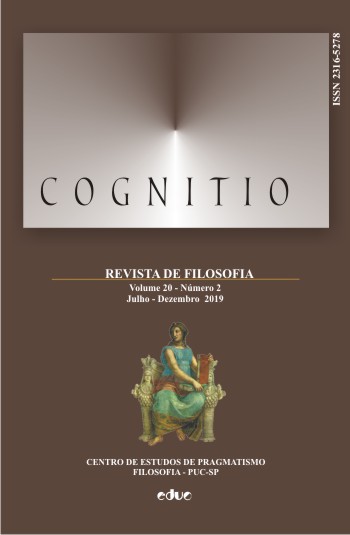Ethics and reasonableness or how to live creatively
DOI:
https://doi.org/10.23925/2316-5278.2019v20i2p244-258Keywords:
Abduction, Creativity, Ethical life, Peirce, Reasonableness.Abstract
The history of philosophical ethics is, largely, an attempt to elucidate the way in which human beings can foster an êthos, in order to reach their own fullness. Were Peirce asked to show, first, what he meant by the êthos of the philosopher or scientist, he would easily answer that it is the search for ideal and eternal verities, i.e., the very reasonableness that governs the universe. Were he asked, right after, what the êthos of human beings in general is, that is to say, what guides and gives meaning to every person’s life, his answer would not differ much from the previous one: all human beings, by their concrete actions, ought to incarnate that reasonableness, admirable ideal or summum bonum in their own lives. Peirce’s well known answer contains a deeply creative view of ethical life: this is the progressive and continuous construction of various possibilities of action, by which each person configures her own êthos, according to that admirable end, which is a representation of what could be a good, desirable and flourishing life. This may not seem original in the context of the history of philosophical ethics—Aristotle had already said something similar. However, there are two very rich and suggestive notions in Peirce's thought, which might arguably be recovered, since they can significantly contribute to that reflection, namely: reasonableness and abduction. As I will try to show, for Peirce to live ethically is to live creatively.Downloads
Published
2020-02-16
How to Cite
Boero, H. (2020). Ethics and reasonableness or how to live creatively. Cognitio: Revista De Filosofia, 20(2), 244–258. https://doi.org/10.23925/2316-5278.2019v20i2p244-258
Issue
Section
Cognitio Papers









